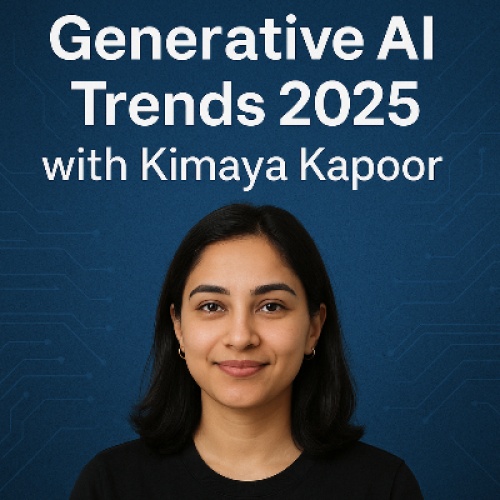As we step into 2025, Generative AI stands out as one of the most disruptive and talked-about technologies. From content creation to design and business automation, AI is reshaping industries at lightning speed. In this post, AI expert Kimaya Kapoor shares her thoughts on the future of Generative AI and why it matters more than ever.
What Is Generative AI? A Quick Overview
Generative AI refers to artificial intelligence systems capable of creating new content - whether it's text, images, music, or even software code. Tools like ChatGPT, Midjourney, and Stable Diffusion are driving innovation in:
Content marketing
Product design
Music and art creation
Customer service automation
Kimaya Kapoor explains, "Generative AI is no longer a futuristic concept. It's already integrated into how we work, create, and connect in 2025."
Generative AI Trends to Watch in 2025
According to Kimaya Kapoor, these are the top trends driving the rise of Generative AI this year:
1. AI-Powered Content Creation
Brands and creators are using AI tools to generate high-quality blogs, ad copy, and social media content at scale.
2. Personalized Customer Experiences
E-commerce and digital platforms now use AI to deliver tailored experiences, boosting engagement and sales.
3. AI in Visual Design
Graphic designers use platforms like DALL�E 3 to brainstorm, prototype, and even finalize creative work faster than ever.
4. Code Generation and Automation
Developers are relying on AI coding assistants to write, debug, and optimize code - dramatically increasing productivity.
Kimaya Kapoor's Take: How Generative AI Is Shaping the Future
"Generative AI is not just a tool - it's a co-creator," says Kimaya Kapoor. "It empowers professionals to scale their work, unlock creativity, and reimagine problem-solving across industries."
She adds that responsible AI development is key. "Ethical use and transparency in AI are critical for long-term success. The real power lies in how we choose to use it."
What Is Generative AI? A Quick Overview
Generative AI refers to artificial intelligence systems capable of creating new content - whether it's text, images, music, or even software code. Tools like ChatGPT, Midjourney, and Stable Diffusion are driving innovation in:
Content marketing
Product design
Music and art creation
Customer service automation
Kimaya Kapoor explains, "Generative AI is no longer a futuristic concept. It's already integrated into how we work, create, and connect in 2025."
Generative AI Trends to Watch in 2025
According to Kimaya Kapoor, these are the top trends driving the rise of Generative AI this year:
1. AI-Powered Content Creation
Brands and creators are using AI tools to generate high-quality blogs, ad copy, and social media content at scale.
2. Personalized Customer Experiences
E-commerce and digital platforms now use AI to deliver tailored experiences, boosting engagement and sales.
3. AI in Visual Design
Graphic designers use platforms like DALL�E 3 to brainstorm, prototype, and even finalize creative work faster than ever.
4. Code Generation and Automation
Developers are relying on AI coding assistants to write, debug, and optimize code - dramatically increasing productivity.
Kimaya Kapoor's Take: How Generative AI Is Shaping the Future
"Generative AI is not just a tool - it's a co-creator," says Kimaya Kapoor. "It empowers professionals to scale their work, unlock creativity, and reimagine problem-solving across industries."
She adds that responsible AI development is key. "Ethical use and transparency in AI are critical for long-term success. The real power lies in how we choose to use it."






